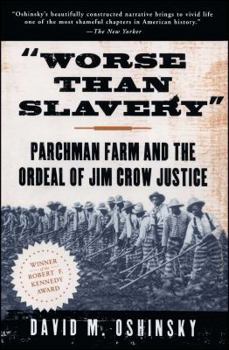Worse Than Slavery
Select Format
Select Condition 
Book Overview
In this sensitively told tale of suffering, brutality, and inhumanity, Worse Than Slavery is an epic history of race and punishment in the deepest South from emancipation to the Civil Rights Era--and beyond. Immortalized in blues songs and movies like Cool Hand Luke and The Defiant Ones, Mississippi's infamous Parchman State Penitentiary was, in the pre-civil rights south, synonymous with cruelty. Now, noted historian...
Format:Paperback
Language:English
ISBN:0684830957
ISBN13:9780684830957
Release Date:April 1997
Publisher:Free Press
Length:320 Pages
Weight:0.75 lbs.
Dimensions:0.9" x 5.4" x 8.4"
Customer Reviews
2 ratings
Disturbing yet fascinating southern history
Published by Thriftbooks.com User , 25 years ago
David M. Oshinsky's "Worse than Slavery": Parchman Farm and the Ordeal of Jim Crow Justice, tells yet another piece of recent, uncomfortable American history which must not be forgotten. Mississippi, like other southern states after the Civil War, did not deal well with freed blacks, and developed the system of "Jim Crow justice" which, in many respects, replicated slavery. Initially, the state leased prisoners -- usually blacks -- to private individuals, usually to pick cotton and do other heavy labor. As Oshinsky presciently concludes, this resulted in a more onerous existence for the black contract workers than when they were slaves. Owners, at least, had a vested interest in keeping their slaves fed and clothed, as they represented a substantial investment of capital. Persons leasing convict labor had no such capital investment, and, as a result, had no incentive (other than humanitarian, which, Oshhinsky notes, usually begged the question in white southern minds as to whether blacks were "human" at all) to keep workers from starving or working to death. The system of convict labor, considered "enlightened" by many at the time - and a great source of profit for the State - was an exercise in barbarism.Parchman Farm, a huge cotton plantation in the Mississippi delta, represented an improvement, in that Mississippi itself owned and operated the farm and tended to feed and house the convicts. The system, however, was far from just, in that prisoners were armed and chosen to guard their fellow inmates, profit was a main goal and justification of the system, and no effort was made to rehabilitate the inmates. Only in the last quarter of this century was Parchman reformed through a series of federal court orders defining the situation as "cruel and unusual punishment." Oshinsky writes extremely well, and both his research and insight are impressive. If one wants an example of how Reconstruction did not work, and the lives of rural southern blacks up through the civil rights victories of the last few decades, I recommend this book highly.
Slavery in the not so distant past
Published by Thriftbooks.com User , 27 years ago
Most of us associate the word slavery with the antebellumSouth. David M. Oshinsky brilliantly chronicles the aftermath of theCivil War in the heart of Dixie and exposes the ensuing camouflaged forms of slavery, "prison labor" and "convict leasing", that thrived for generations. Not only does the author recount the inconceivable conditions suffered by prisoners of Parchman Farm, but also reconciles the social, political, and legal environments that fabricated these new "forms" of slavery. The South's steadfast resistance to change, coupled with its dependence upon slave labor, produced a justice system designed to swiftly convict blacks of misdemeanor crimes while blatantly ignoring whites for similar charges. The imprisonment of blacks during the reconstruction era through the late 1950's, provided cheap labor for state and local governments, which subsequently assimilated their sweat and blood into the economy. Due to the lack of singular ownership of the condemned, black prisoners frequently died in the fields, the forests, and the mines, and endured inhumane treatment "worse than slavery". This incredible book delves well beyond the pastures of Parchman Farm, unearthing a disgraceful portrait of the South and revealing the deliberate reluctance of the North to enforce the change sacrificed for in the Civil War.







